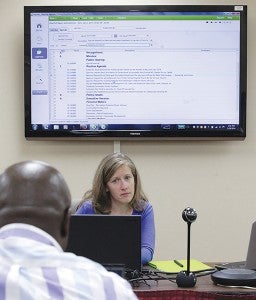City to go paperless
Published 12:00 am Saturday, May 31, 2014
The Board of Mayor and Aldermen goes paperless June 10 in a move officials say will make city government more efficient and more transparent for residents.
When the board meets June 10, Mayor George Flaggs Jr. and Aldermen Michael Mayfield and Willis Thompson will review their agendas and supporting documents during their meeting from iPads instead of the paper versions. The board’s actions will simultaneously be put on the city’s website during the meeting so residents can view them immediately after meeting.
“That’s the goal,” city information technology director Billy Gordon said, “from this point forward, we’re going to be reducing paper, and making government more transparent to the people and more efficient. You want to make the public aware, get them involved.”
Paperless board meetings, city officials said, is the first phase of a project that eventually will make all city departments paperless and more accessible to citizens.
It is the result of a two-month process involving a committee of Gordon, Thompson and City Clerk Walter Osborne, and representatives from Granicus, a San Francisco-based government information technology company that provides the software that allows the city to stream the board meetings on its website at www.vicksburg.org.
“We updated our equipment as well as our software,” Gordon said. “This is all being done in the cloud (system).”
Under the system, when an item comes to the city clerk’s office for a board meeting agenda, it is immediately emailed to the board members, who decide whether to put it on the agenda.
“When they (the clerk’s office) get ready to generate an agenda, it’s immediately published for the public on the website, and there will be a link on the website,” Gordon said, adding there will be an icon on the website’s home page that says, “public meeting, agenda and minutes,” “so it will be hard to miss.”
People attending the meetings will be able to follow it by viewing the agenda as it is scrolled on a wide screen TV in the boardroom.
“In the age of tablets and smart phones, where people use them to look at documents, that (agenda) information will be at their fingertips,” Thompson said. “They can follow on their phones and not have to watch the monitor.”
The agendas will also be in a different format, Osborne said, adding the items will be under categories “the way agendas should be. Only a handful of cities in Mississippi have this.”
As the meeting goes on, an employee from the clerk’s office will use another part of the information system to index the meeting video and begin preparing the minutes.
“After the meeting’s done, that minutes preparation is sent into the system, the minutes are finalized and able to be published at that point,” Gordon said. He said videos of the meeting would be indexed to allow someone to go to a specific topic discussed.
“If you have an agenda with 15 items on it, and I have something where I’ve submitted a bid that’s on item 12, instead of watching the entire board meeting to see what’s said when they get to my section, I can click item No. 12 and it advances the video to that point,” he said.
Besides storing videos from past meetings, the system will also archive board minutes from June 10 forward, allowing people to go back and examine board minutes for specific issues. Currently, if someone wants to view the minutes of a certain meeting, they must submit a freedom of information request and wait up to seven days for approval before they can view the documents.
“People will get more information if they go on line than if they went to FOIA,” Flaggs said.
Osborne added, however, there are no plans at present to put earlier board minutes on line.
Thompson said digitizing the agenda cuts the number of times an item has to be reviewed before going on the agenda.
“Right now, things come to the clerk’s office, they come through legal, and then they have to be routed to each one of us and we decide whether to put it on the agenda, and then it comes back to the clerk and put in the books and passed around again,” he said. “That’s time we’re losing to put together an agenda.”
“It actually streamlines a lot of the work we’ve taken hours to do in the past,” Osborne said. “Initially, it’s going to be a little time consuming, because it’s getting used to the change.
“There’s a few more steps that we have to do, but they’re keystrokes, as opposed to getting up and actually photo copying all the agenda items, the agenda itself, and then putting it in a binder for the board. This way, they can view it whether it’s on their iPads or their desktops. They’ll be able to view it as soon as it’s published.”
One thing he likes about going totally on line, Thompson said, “I don’t have to be in the office to look at the agenda.”
“Whether you’re here or in California, you’re in the general creation process. Everything is right there with the touch of a computer. You’re involved; you’re in the loop. It saves time and it saves money. We’re more transparent, because now we can publish the board minutes and the agendas online on our website in a matter of a couple of days versus a few weeks. We’re just trying to improve efficiency.”
“We’re still in the business of providing the very best service we can at the least cost to the taxpayer,” Flaggs said.







